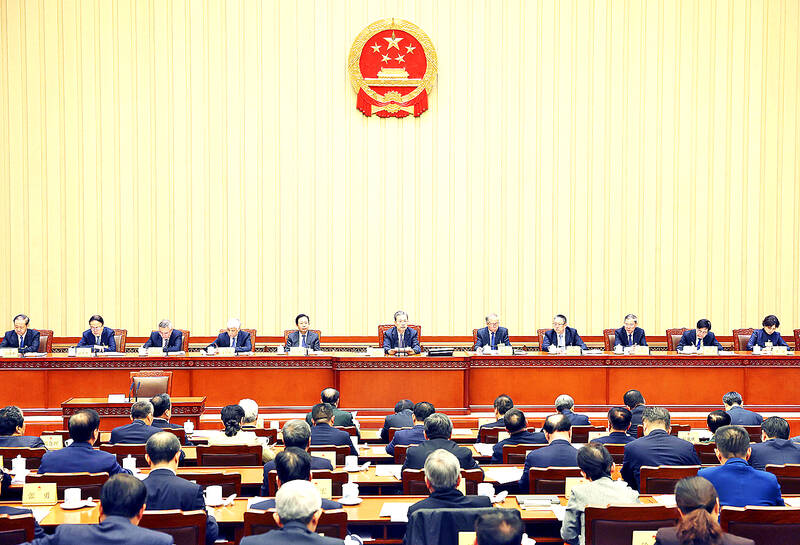Chinese lawmakers have expanded Beijing’s state secrets law for the first time since 2010, widening the scope of restricted sensitive information to “work secrets,” according to a full text of the law published online, state media reported.
China’s top legislative body on Tuesday passed the revised Law on Guarding State Secrets, which is to take effect from May 1, state-run Xinhua news agency reported.
Analysts say the expanded law is further evidence of Chinese President Xi Jinping’s (習近平) increased focus on national security, which has already led to a wide-ranging update to Beijing’s anti-espionage law in April last year that some countries fear could be used to punish regular business activities.

Photo: EPA-EFE / XINHUA / LIU WEIBING
Raids last year by Chinese police on several management consultancies, including Mintz Group and Bain & Co, have raised concerns among the foreign business community in China, and a Japanese pharmaceutical executive has also been detained in Beijing on espionage allegations since March last year.
State secrets involve areas ranging from government and Chinese Communist Party decisionmaking to military and diplomatic activities, as well as economic development, science and technology.
The update to the law requires government agencies and work units to protect pieces of information “that are not state secrets, but will cause certain adverse effects if leaked.”
It added that rules on the specific management of work secrets would be released separately, without giving a date.
The revised law would “strengthen the systematization, comprehensiveness and synergy” of the set of laws concerning national security and state secrets, Xinhua quoted an unnamed official from the Chinese National Administration of State Secrets Protection as saying.
“This revision ... has clearly written the Party’s management of secrecy into the law,” the official said, adding that online operators should “cooperate with relevant departments in investigating and handling cases suspected of leaking state secrets.”
The legislation also “strengthens” coordination with China’s Data Security Law for the management of confidential data, the official said.
The Ministry of State Security has increasingly taken to its official WeChat social media account since last year to warn the public to stay vigilant against foreign espionage efforts.

‘UNUSUAL EVENT’: The Australian defense minister said that the Chinese navy task group was entitled to be where it was, but Australia would be watching it closely The Australian and New Zealand militaries were monitoring three Chinese warships moving unusually far south along Australia’s east coast on an unknown mission, officials said yesterday. The Australian government a week ago said that the warships had traveled through Southeast Asia and the Coral Sea, and were approaching northeast Australia. Australian Minister for Defence Richard Marles yesterday said that the Chinese ships — the Hengyang naval frigate, the Zunyi cruiser and the Weishanhu replenishment vessel — were “off the east coast of Australia.” Defense officials did not respond to a request for comment on a Financial Times report that the task group from

Chinese authorities said they began live-fire exercises in the Gulf of Tonkin on Monday, only days after Vietnam announced a new line marking what it considers its territory in the body of water between the nations. The Chinese Maritime Safety Administration said the exercises would be focused on the Beibu Gulf area, closer to the Chinese side of the Gulf of Tonkin, and would run until tomorrow evening. It gave no further details, but the drills follow an announcement last week by Vietnam establishing a baseline used to calculate the width of its territorial waters in the Gulf of Tonkin. State-run Vietnam News

DEFENSE UPHEAVAL: Trump was also to remove the first woman to lead a military service, as well as the judge advocates general for the army, navy and air force US President Donald Trump on Friday fired the chairman of the Joint Chiefs of Staff, Air Force General C.Q. Brown, and pushed out five other admirals and generals in an unprecedented shake-up of US military leadership. Trump wrote in a post on Truth Social that he would nominate former lieutenant general Dan “Razin” Caine to succeed Brown, breaking with tradition by pulling someone out of retirement for the first time to become the top military officer. The president would also replace the head of the US Navy, a position held by Admiral Lisa Franchetti, the first woman to lead a military service,

Four decades after they were forced apart, US-raised Adamary Garcia and her birth mother on Saturday fell into each other’s arms at the airport in Santiago, Chile. Without speaking, they embraced tearfully: A rare reunification for one the thousands of Chileans taken from their mothers as babies and given up for adoption abroad. “The worst is over,” Edita Bizama, 64, said as she beheld her daughter for the first time since her birth 41 years ago. Garcia had flown to Santiago with four other women born in Chile and adopted in the US. Reports have estimated there were 20,000 such cases from 1950 to